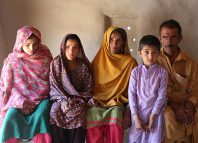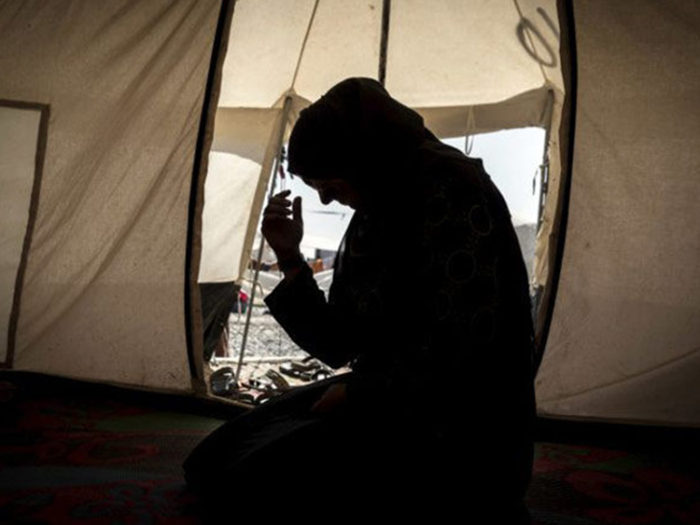Addressing Safeguarding and Protection against SEA in COVID-19
Photo Credit: AP
Since the spread of COVID-19, as many individuals and organizations around the world are operating remotely the risk of Sexual and Gender Based Violence (GBV) Sexual Exploitation and Abuse (SEA) cases, as well as fraud and corruption is more likely to increase than to decrease. In a time when such threats are on a rise, the humanitarian and development community must be vigilant and prepared to ensure that affected people are protected and that they remain at the centre of our work.
To remind humanitarian practitioners on how to effectively practice and ensure community protection against sexual violence, exploitation and abuse, Community World Service Asia and Act Church of Sweden jointly hosted a webinar on ‘Protection against Sexual Exploitation and Abuse during COVID-19 Response.’
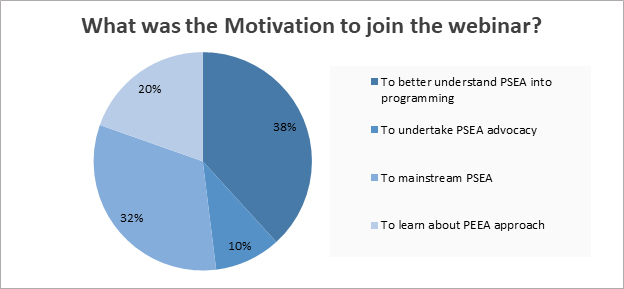
Speaking about PSEA[1], Ester Dross, lead facilitator and moderator of the webinar, shared a brief history of SEA and what we need to change, to implement effective PSEA policies and processes,
In 2001, a study commissioned by Save the Children highlighted high levels of sexual exploitation and abuse happening in refugee camps in West Africa. Exchange for sex against food or other vital services did not only happen amongst refugees themselves, but also from humanitarian workers to refugees. Since, many other studies had similar findings. As a result, most of organizations today have Code of Conducts or separate policies including protection from sexual exploitation and abuse. Policy violations unfortunately continue to come to light, underlining the need of continuing focusing on PSEA and work on improved implementation of these policies.
Sexual misconduct is a broad term encompassing any unwelcome behavior of a sexual nature that is committed without consent or by force, intimidation, coercion, or manipulation. Sexual misconduct can be committed by a person of any gender, and it can occur between people of the same or different gender. The webinar highlighted the three types of misconducts; Sexual Exploitation and Abuse, Sexual Harassment and Sexual Gender Based Violence.
Power imbalance always lies at the root of the various forms of sexual misconduct. This disparity is heightened while employed and residing in tough situations, where conflict, catastrophe, hardship or even a pandemic has forced the most disadvantaged people towards much greater inequities, with higher threats and lesser control.
More than 250 humanitarian and development practitioners took part in this 90-minute discussion-based webinar that shared a wide array of diverse expertise and knowledge from all over the world. Panelists, Sylvie Robert, PSEA Coordinator, Ethiopia, Maria Kjersem, PSEA Network Co-Chair, UN Women, Ethiopia, Seng Aung Sein Myint, National PSEA Coordinator for the PSEA Network, Myanmar, Jules L. Frost, Head of Programmes & Partnerships, CHS Alliance, Geneva and Elisa Cappelletti, PSEA Network Coordinator, Bangladesh joined the session to share best practices on the topic under discussion. Considering the current COVID-19 crisis, the panelists shared best practices on effective inclusion, information sharing, recruitments and trainings on prevention and protection from sexual exploitation and abuse.
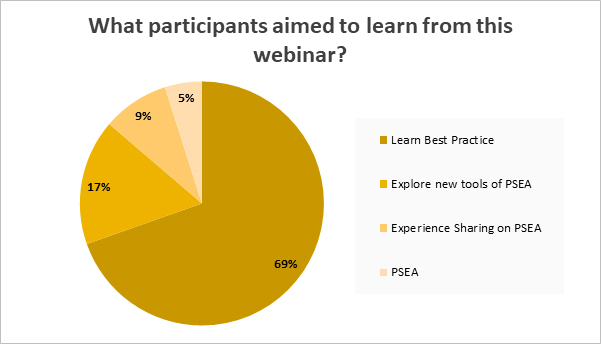
Identifying Gaps to improve Protection from Sexual Exploitation and Abuse
In terms of improvement, the two major area where progress is most required are identified as awareness on policies and rights and the need for efficient and robust complaints systems. Both are linked not only to meaningful participation and effective information sharing, but also to senior management commitment to implement policies and take disciplinary measures if needed.
said Ester,To resolve gaps in these areas, organizations need to ensure that they remind populations of their rights, their entitlements, what to anticipate from organizations operating in the neighborhood, what laws are relevant and what actions to anticipate from workers while employed remotely and know what constraints are in effect,
We need to continue to promote involvement by the communities to ensure that behavioral rules in our policies are well understood and that our CRM[2] is still relevant, or to consider alternative ways to address feedback, contribute to community understanding of anticipated activities and what to do if there are severe concerns.
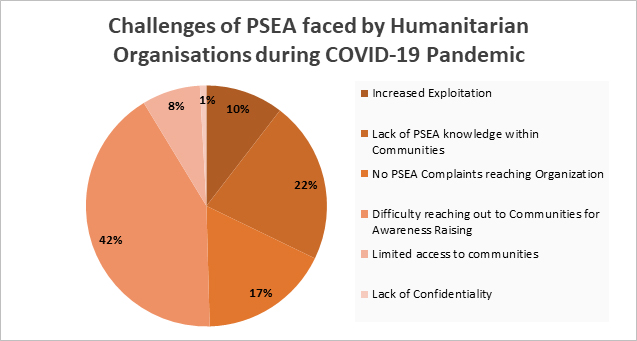
What is different today? What key issues and challenges can we identify during the current crisis?
Participants in the webinar discussed the main obstacles they face in relation to implementation of PSEA in the continuing pandemic.
- Existing taboos prevent communities from disclosing sexual exploitation to others, which becomes a major challenge in identifying actual cases
- Inadequate budgets to include capacity development around PSEA and strengthening complaints mechanisms and procedures with implementing partners
- Lack of awareness and accessibility, as well as deep rooted cultural practices hinder prevention of SEA
- Failure to apply current PSEA policies on the ground. Many policies and procedures are in effect but field workers are not yet aware of them
- Maintaining confidentiality when working and investigating remotely
- Increased risk of violation of data protection as more information is communicated through unprotected channels
- Increased use of technology also for receiving sensitive complaints – exclusion of people with no access to technology or low technological knowledge
Ensuring adequate information sharing and participation from communities, and receiving and investigating complaints has currently become a global challenge.
We need to be vigilant and prepared!
Think creatively! We will not be able to address all our problems, but we can curtail the present scenario by resolving some of the issues. Ester highlighted some key practices that global humanitarian community can strongly work together on to prevent sexual exploitation, abuse, violence and harassment.
- Policies: Most of us have made strong public commitments to policies on PSEA. It is important to reiterate those public commitments, remind staff and communities what we want to implement and how.
- Inclusion: Inequalities and vulnerabilities have become even more exacerbated. A commitment to inclusion of a wide set of different voices will significantly and positively influence long-term objectives and changes for the communities we work with.
- Participation and Information: As already underlined before, communication and participation have always been key. Communities must continue to have a voice for them to make choices through meaningful participation, even in times of rapid responsiveness and restricted access.
- Awareness Raising and Training: To be successful in raising awareness and improving participation, communication and inclusion, a specific focal point for prevention of sexual exploitation and abuse (PSEA focal point) working with staff and communities and identifying specific risks related to sexual exploitation and abuse in regards to the COVID-19 response should be designated for each program, country and region. These can be first line responders, medical staff, protection officers and others.
Key Takeaways:
- “I found the webinar to be very informative with practical examples of ensuring that PSEA is not forgotten about in times of restricted access but instead rethink alternative ways to inform beneficiaries and receive complaints.” Tracy Robinson
- “The current crisis motivates us to link up and openly share experiences and challenges on PSEA. This is an opportunity!” Sylvie Robert
- “Assessment is a vital practice through which we can ask what you need as a community to address your complaints on PSEAH – The concept of ‘nothing about us without us’ applied.” Axel Schmidt
- “GBV inside the communities is extremely important but needs to be tackled differently from SEA as we do not have a direct influence on the community members. So, this is more about advocacy but obviously needs to come into account in terms of our programming.” Ester Dross
- “The different modalities shared in the session will be helpful to identify contextual initiatives on PSEA.” Mausumi Sharmin
[1]Protection from Sexual Exploitation and Abuse
[2]Complaints Response Mechanism





